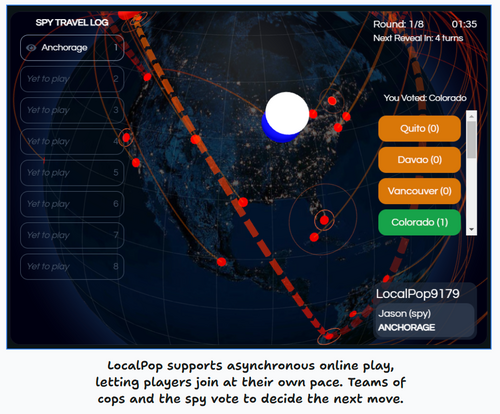Devlog #1: Announcing a New Community Game

Devlog #1: Announcing a New Community Game
This is the first devlog for my new game, a community-driven experience that can be played on Reddit. Rather than repeating the basic game details—those can be found on the game’s description page—I want to use this space to document my thoughts and the development process.
Inspiration: Scotland Yard and Beyond
My fascination with board games started early, and one of the first that truly captivated me was Scotland Yard. I was quite young when I first played it, introduced to it by a neighbor who owned a set. The thrill of deduction and strategy was unforgettable—at that moment, I thought it was the best board game ever, and honestly, it might still be.
Beyond Scotland Yard, my experience with board games included classics like Monopoly, Battleship, Game of Life, and some war strategy games whose names I can’t recall. But Scotland Yard stood out because of its engaging deduction mechanics and map-based gameplay.
The Appeal of the Map
One of the first things that drew me into Scotland Yard was the board itself—a map of London with color-coded connections and iconography.
While I don’t remember all the gameplay details, what fascinated me was the idea of deduction through elimination. That core mechanic—narrowing down possibilities to deduce the opponent’s movements—is something I find incredibly engaging.
Taking It to a Global Scale
For this game, I’m trying something similar but on a globe instead of a flat map. This introduces unique challenges in how nodes and connections are laid out. Unlike a fixed map, a globe wraps around, making it quite different from traditional board games. Both can be represented as graph networks, meaning the positioning isn’t what truly matters—it’s how the connections function that makes the difference.
One major contrast between a globe and a board game map is how the edges are treated. A board game has fixed boundaries, while a globe has no real edges, which changes movement and strategy significantly.
Dynamic, Algorithm-Generated Maps
Another key difference is that traditional board games use a static, unchanging map. You buy the game once, and the board remains the same every time you play. With this project, I’m aiming for a more dynamic experience where maps are algorithmically generated for each game.
Rather than being completely random, the map generation follows a deterministically random process. Each game’s unique identifier influences the algorithm, selectively creating connections to form a playable map. This approach allows for variability while maintaining structured gameplay. However, this system is still in its early stages, and I need to test how well it performs in generating balanced and engaging connections.
Simplifying for Online Play
Since this is an online game, I’ve opted for a simplified design. The number of cities is intentionally lower, making it easier for multiple players to follow along in an ongoing game. Additionally, there is only one type of connection between locations, reducing complexity while maintaining strategic depth.
The connections themselves follow a hub-and-spoke model, inspired by how airlines design their routes between cities. This structure should create natural and logical pathways across the game world while keeping gameplay intuitive.
What’s Next?
This is just the beginning of the development journey. There’s a lot to refine, from map generation to balancing mechanics for an engaging player experience. I’ll be sharing updates as I continue working on the game, testing features, and tweaking the design.
LocalPop
A worldwide chase where cops hunt, and the spy hides.
| Status | Prototype |
| Author | amitlzkpa |
| Genre | Strategy, Survival |
| Tags | 3D, Board Game, Co-op, Prototype, Team-Based |
| Languages | English |
Leave a comment
Log in with itch.io to leave a comment.